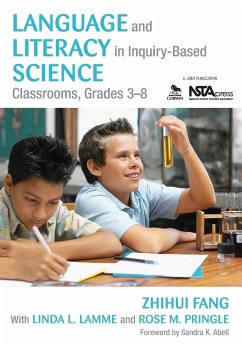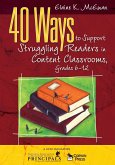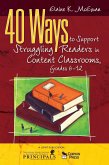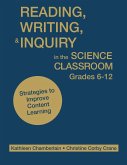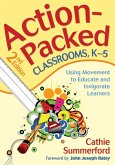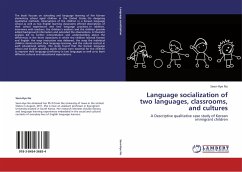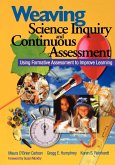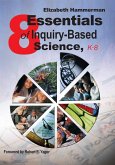Zhihui Fang, Linda L. Lamme, Rose M. Pringle
Language and Literacy in Inquiry-Based Science Classrooms, Grades 3-8
Zhihui Fang, Linda L. Lamme, Rose M. Pringle
Language and Literacy in Inquiry-Based Science Classrooms, Grades 3-8
- Broschiertes Buch
- Merkliste
- Auf die Merkliste
- Bewerten Bewerten
- Teilen
- Produkt teilen
- Produkterinnerung
- Produkterinnerung
This hands-on resource offers a wealth of strategies aligned with national science education standards, including sample lessons for integrating reading instruction into inquiry-based science classrooms.
Andere Kunden interessierten sich auch für
![40 Ways to Support Struggling Readers in Content Classrooms, Grades 6-12 40 Ways to Support Struggling Readers in Content Classrooms, Grades 6-12]() Elaine K. McEwan40 Ways to Support Struggling Readers in Content Classrooms, Grades 6-1239,99 €
Elaine K. McEwan40 Ways to Support Struggling Readers in Content Classrooms, Grades 6-1239,99 €![40 Ways to Support Struggling Readers in Content Classrooms, Grades 6-12 40 Ways to Support Struggling Readers in Content Classrooms, Grades 6-12]() Elaine K. McEwan40 Ways to Support Struggling Readers in Content Classrooms, Grades 6-1283,99 €
Elaine K. McEwan40 Ways to Support Struggling Readers in Content Classrooms, Grades 6-1283,99 €![Reading, Writing, and Inquiry in the Science Classroom, Grades 6-12 Reading, Writing, and Inquiry in the Science Classroom, Grades 6-12]() Kathleen ChamberlainReading, Writing, and Inquiry in the Science Classroom, Grades 6-1235,99 €
Kathleen ChamberlainReading, Writing, and Inquiry in the Science Classroom, Grades 6-1235,99 €![Action-Packed Classrooms, K-5 Action-Packed Classrooms, K-5]() Cathie SummerfordAction-Packed Classrooms, K-539,99 €
Cathie SummerfordAction-Packed Classrooms, K-539,99 €![Language socialization of two languages, classrooms, and cultures Language socialization of two languages, classrooms, and cultures]() Seon-Hye NoLanguage socialization of two languages, classrooms, and cultures51,99 €
Seon-Hye NoLanguage socialization of two languages, classrooms, and cultures51,99 €![Weaving Science Inquiry and Continuous Assessment Weaving Science Inquiry and Continuous Assessment]() Maura O'Brien CarlsonWeaving Science Inquiry and Continuous Assessment32,99 €
Maura O'Brien CarlsonWeaving Science Inquiry and Continuous Assessment32,99 €![Eight Essentials of Inquiry-Based Science, K-8 Eight Essentials of Inquiry-Based Science, K-8]() Elizabeth HammermanEight Essentials of Inquiry-Based Science, K-838,99 €
Elizabeth HammermanEight Essentials of Inquiry-Based Science, K-838,99 €-
-
-
This hands-on resource offers a wealth of strategies aligned with national science education standards, including sample lessons for integrating reading instruction into inquiry-based science classrooms.
Hinweis: Dieser Artikel kann nur an eine deutsche Lieferadresse ausgeliefert werden.
Hinweis: Dieser Artikel kann nur an eine deutsche Lieferadresse ausgeliefert werden.
Produktdetails
- Produktdetails
- Verlag: Corwin
- Artikelnr. des Verlages: B88421P
- Seitenzahl: 168
- Erscheinungstermin: 7. September 2010
- Englisch
- Abmessung: 254mm x 178mm x 9mm
- Gewicht: 329g
- ISBN-13: 9781412988421
- ISBN-10: 141298842X
- Artikelnr.: 30180036
- Herstellerkennzeichnung
- Libri GmbH
- Europaallee 1
- 36244 Bad Hersfeld
- gpsr@libri.de
- Verlag: Corwin
- Artikelnr. des Verlages: B88421P
- Seitenzahl: 168
- Erscheinungstermin: 7. September 2010
- Englisch
- Abmessung: 254mm x 178mm x 9mm
- Gewicht: 329g
- ISBN-13: 9781412988421
- ISBN-10: 141298842X
- Artikelnr.: 30180036
- Herstellerkennzeichnung
- Libri GmbH
- Europaallee 1
- 36244 Bad Hersfeld
- gpsr@libri.de
Zhihui Fang (Ph.D., Purdue University) is Professor of Language and Literacy Education in the School of Teaching and Learning at the University of Florida, where he also coordinates the Reading Education program. He specializes in content area reading and writing, language development, and teacher education. His recent research focuses on the role of language in construing disciplinary knowledge and in shaping students' literacy development. He is particularly interested in exploring the use of evidence-based language and literacy practices to support science teaching and learning. Zhihui has authored over 70 publications that include books, book chapters, and journal articles. His Reading in Secondary Content Areas: A Language-Based Pedagogy (University of Michigan Press, 2008), co-authored with Mary Schleppegrell, describes a new approach to teaching reading in the subjects of science, mathematics, social studies, and language arts. He can be contacted at zfang@coe.ufl.edu.
Foreword by Sandra K. Abell
Acknowledgments
About the Authors
About the Co-Authors
1. Teaching Science as Inquiry
Inquiry-Based Science
Language and Literacy in Inquiry-Based Science
Overview of This Book
2. The Challenges of Science Reading
What Does It Take to Comprehend a Text?
Linguistic Challenges of Science Reading
Conclusion
3. Using Trade Books to Support Science Inquiry
Why Read Trade Books in Science?
Award-Winning Science Trade Books
Becoming Familiar With the Format of Science Trade Books
Using Trade Books to Empower Science Learning
Conclusion
4. Learning Language, Learning Science
Building a Language-Rich Science Curriculum
Developing Vocabulary Knowledge
Learning About Nouns
Disentangling Discourse
Conclusion
5. Scaffolding Reading Through Strategy Instruction
Reading Strategy Instruction and Text Comprehension
Reading Strategy Instruction in Action: A Vignette
Bootstrapping Comprehension: Activating and Integrating Prior Knowledge
Monitoring Comprehension: Promoting Thinking During Reading
Consolidating Comprehension: Organizing Information From Text
Principles and Practice of Reading Strategy Instruction in Science
Conclusion
6. Learning to Write and Writing to Learn in Science
Why Write in Science?
Learning to Write Scientifically
Writing to Learn in Science: An Instructional Framework
Implementing the Writing-to-Learn-Science Instructional Model
Classroom Activities That Promote Writing to Learn Science
Conclusion
Endnotes
References
Index
Acknowledgments
About the Authors
About the Co-Authors
1. Teaching Science as Inquiry
Inquiry-Based Science
Language and Literacy in Inquiry-Based Science
Overview of This Book
2. The Challenges of Science Reading
What Does It Take to Comprehend a Text?
Linguistic Challenges of Science Reading
Conclusion
3. Using Trade Books to Support Science Inquiry
Why Read Trade Books in Science?
Award-Winning Science Trade Books
Becoming Familiar With the Format of Science Trade Books
Using Trade Books to Empower Science Learning
Conclusion
4. Learning Language, Learning Science
Building a Language-Rich Science Curriculum
Developing Vocabulary Knowledge
Learning About Nouns
Disentangling Discourse
Conclusion
5. Scaffolding Reading Through Strategy Instruction
Reading Strategy Instruction and Text Comprehension
Reading Strategy Instruction in Action: A Vignette
Bootstrapping Comprehension: Activating and Integrating Prior Knowledge
Monitoring Comprehension: Promoting Thinking During Reading
Consolidating Comprehension: Organizing Information From Text
Principles and Practice of Reading Strategy Instruction in Science
Conclusion
6. Learning to Write and Writing to Learn in Science
Why Write in Science?
Learning to Write Scientifically
Writing to Learn in Science: An Instructional Framework
Implementing the Writing-to-Learn-Science Instructional Model
Classroom Activities That Promote Writing to Learn Science
Conclusion
Endnotes
References
Index
Foreword by Sandra K. Abell
Acknowledgments
About the Authors
About the Co-Authors
1. Teaching Science as Inquiry
Inquiry-Based Science
Language and Literacy in Inquiry-Based Science
Overview of This Book
2. The Challenges of Science Reading
What Does It Take to Comprehend a Text?
Linguistic Challenges of Science Reading
Conclusion
3. Using Trade Books to Support Science Inquiry
Why Read Trade Books in Science?
Award-Winning Science Trade Books
Becoming Familiar With the Format of Science Trade Books
Using Trade Books to Empower Science Learning
Conclusion
4. Learning Language, Learning Science
Building a Language-Rich Science Curriculum
Developing Vocabulary Knowledge
Learning About Nouns
Disentangling Discourse
Conclusion
5. Scaffolding Reading Through Strategy Instruction
Reading Strategy Instruction and Text Comprehension
Reading Strategy Instruction in Action: A Vignette
Bootstrapping Comprehension: Activating and Integrating Prior Knowledge
Monitoring Comprehension: Promoting Thinking During Reading
Consolidating Comprehension: Organizing Information From Text
Principles and Practice of Reading Strategy Instruction in Science
Conclusion
6. Learning to Write and Writing to Learn in Science
Why Write in Science?
Learning to Write Scientifically
Writing to Learn in Science: An Instructional Framework
Implementing the Writing-to-Learn-Science Instructional Model
Classroom Activities That Promote Writing to Learn Science
Conclusion
Endnotes
References
Index
Acknowledgments
About the Authors
About the Co-Authors
1. Teaching Science as Inquiry
Inquiry-Based Science
Language and Literacy in Inquiry-Based Science
Overview of This Book
2. The Challenges of Science Reading
What Does It Take to Comprehend a Text?
Linguistic Challenges of Science Reading
Conclusion
3. Using Trade Books to Support Science Inquiry
Why Read Trade Books in Science?
Award-Winning Science Trade Books
Becoming Familiar With the Format of Science Trade Books
Using Trade Books to Empower Science Learning
Conclusion
4. Learning Language, Learning Science
Building a Language-Rich Science Curriculum
Developing Vocabulary Knowledge
Learning About Nouns
Disentangling Discourse
Conclusion
5. Scaffolding Reading Through Strategy Instruction
Reading Strategy Instruction and Text Comprehension
Reading Strategy Instruction in Action: A Vignette
Bootstrapping Comprehension: Activating and Integrating Prior Knowledge
Monitoring Comprehension: Promoting Thinking During Reading
Consolidating Comprehension: Organizing Information From Text
Principles and Practice of Reading Strategy Instruction in Science
Conclusion
6. Learning to Write and Writing to Learn in Science
Why Write in Science?
Learning to Write Scientifically
Writing to Learn in Science: An Instructional Framework
Implementing the Writing-to-Learn-Science Instructional Model
Classroom Activities That Promote Writing to Learn Science
Conclusion
Endnotes
References
Index

